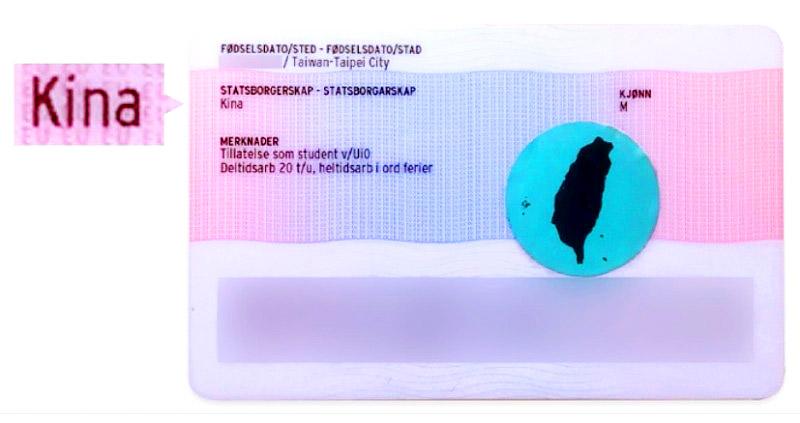A group of overseas Taiwanese in Norway are taking a case on their national identity to the European Court of Human Rights — with plans to file the case in the first half of next year — after Norway’s Supreme Court rejected their appeal to change their listed nationality from “China” to “Taiwan,” Joseph Liu, a Taiwanese lawyer living in Norway, told reporters on Monday.
One of the initiators of the movement, “My Name, My Right,” Liu and his group plan to hire lawyers from the UK and France who know European law and have knowledge of Asia to represent them, he said.
The planned suit stemmed from the group’s failed attempt to force the Norwegian government to change the nationality of local Taiwanese on their local residency permits, he said.

Photo from the “Taiwan: My Name, My Right” petition Web page
Norway in 2010 changed the nationality on permits for Taiwanese from “Taiwan” to “China,” which was seen as an attempt to appease Beijing after the Nobel Peace Prize was awarded to Chinese dissident Liu Xiaobo (劉曉波) that year, Liu said.
In 2018, 10 Taiwanese students launched a fundraising campaign in Taiwan to fund their lawsuit in Norway, including the Norwegian Directorate of Immigration, and collected more than NT$3 million (US$104,290 at the current exchange rate), Liu said.
They used the funds to file cases asking that their listed nationality be changed, but the courts rejected their plea, citing the “one China” policy.
Norway has diplomatic relations with China and does not recognize Taiwan as a sovereign nation.
The group still has about NT$1 million that can be used for a lawsuit in the European Court of Human Rights, Liu said.
Norway is a signatory of the European Convention on Human Rights, which stipulates that a complainant can take a case to the European Court of Human Rights after domestic remedies have been exhausted, he said.
Taiwanese do not hold any personal identification documents issued by China, and therefore listing Taiwanese as Chinese does not conform to the facts, and contravenes Article 8 of the European Convention on Human Rights, he said.
Another goal of the legal action is to raise public awareness in Europe of Taiwan’s predicament and the threat to democracy posed by authoritarian regimes, Liu said.
At a briefing on Tuesday, Ministry of Foreign Affairs spokeswoman Joanne Ou (歐江安) urged Norwegian authorities to “view the issue seriously and correct its errors,” citing Article 15 of the Universal Declaration of Human Rights and Article 6 of the European Convention on Human Rights.
The two articles say respectively that everyone has the right to a nationality and everyone is entitled to a fair trial.
The ministry respects Liu’s decision to take the case to the European Court of Human Rights, Ou said.

The Ministry of Economic Affairs has fined Taobao NT$1.2 million (US$36,912) for advertisements that exceed its approved business scope, requiring the Chinese e-commerce platform to make corrections in the first half of this year or its license may be revoked. Lawmakers have called for stricter enforcement of Chinese e-commerce platforms and measures to prevent China from laundering its goods through Taiwan in response to US President Donald Trump’s heavy tariffs on China. The Legislative Yuan’s Finance Committee met today to discuss policies to prevent China from dumping goods in Taiwan, inviting government agencies to report. Democratic Progressive Party Legislator Kuo Kuo-wen (郭國文) said

The Ministry of Economic Affairs has fined Taobao NT$1.2 million (US$36,900) for advertisements that exceeded its approved business scope and ordered the Chinese e-commerce platform to make corrections in the first half of this year or its license would be revoked. Lawmakers have called for stricter supervision of Chinese e-commerce platforms and more stringent measures to prevent China from laundering its goods through Taiwan as US President Donald Trump’s administration cracks down on origin laundering. The legislature’s Finance Committee yesterday met to discuss policies to prevent China from dumping goods in Taiwan, inviting government agencies to report on the matter. Democratic Progressive Party

Taiwan and its Pacific ally Tuvalu on Tuesday signed two accords aimed at facilitating bilateral cooperation on labor affairs, according to Taiwan’s Ministry of Foreign Affairs (MOFA). The governments inked two agreements in Taipei, witnessed by Foreign Minister Lin Chia-lung (林佳龍) and visiting Deputy Tuvaluan Prime Minister Panapasi Nelesone, MOFA said in a news release. According to MOFA, the agreements will facilitate cooperation on labor issues and allow the two sides to mutually recognize seafarers’ certificates and related training. Taiwan would also continue to collaborate with Tuvalu across various fields to promote economic prosperity as well as the well-being of their

Sung Chien-liang (宋建樑), who led efforts to recall Democratic Progressive Party (DPP) Legislator Lee Kun-cheng (李坤城), was released on bail of NT$80,000 today amid outcry over his decision to wear a Nazi armband to questioning the night before. Sung arrived at the New Taipei District Prosecutors’ Office for questioning in a recall petition forgery case last night wearing a red armband bearing a swastika, carrying a copy of Adolf Hitler’s Mein Kampf and giving a Nazi salute. Sung left the building at 1:15am without the armband and covering the book with his coat. Lee said today that this is a serious